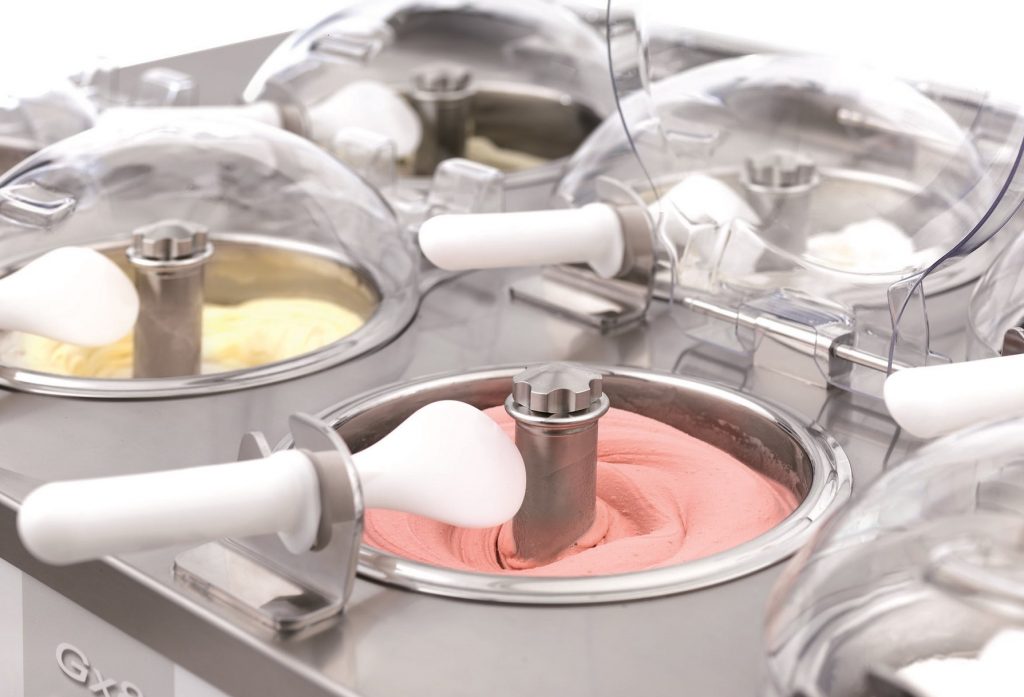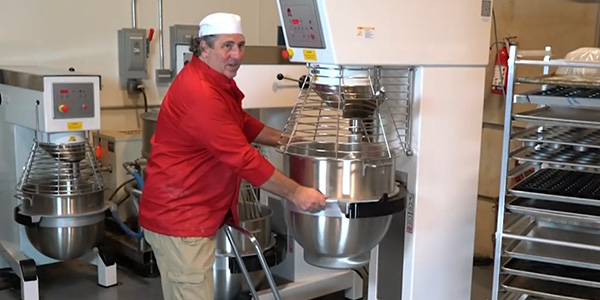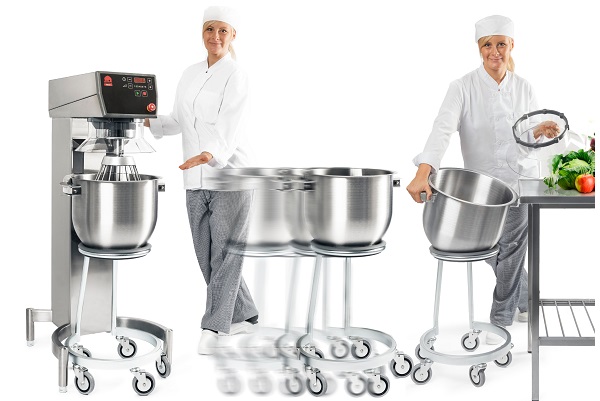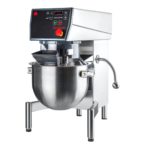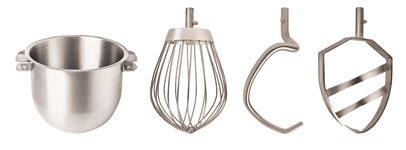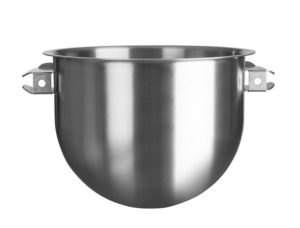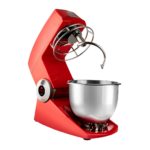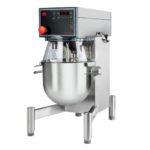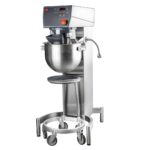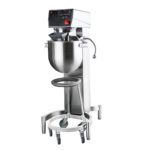A commercial mixer must completely fit the unique needs of the kitchen. Once this happens, operators often see a notable boost in productivity, an increase in efficiency and less money spent on maintenance, repairs and other out of pocket expenses and downtime that could, over time, drive customers away and have a negative impact on the business’ bottom line.
Before investing in a mixer, operators should think about the different kinds of foods they plan to create most often. What kind of dough or batter do their recipes require, and how thick or heavy is its consistency? The volume and weight of ingredients is key to choosing the right mixer and the size required.
Commercial mixers are one of the most basic, yet most important piece of equipment purchased by all kinds of food service businesses from bakeries through to hotel kitchens, and everything in between. Since a food mixer is an important part of any kitchen, and usually quite and investment, its important to make sure you choose the right mixer for your business.
What types of commercial mixer are there?
There’s two main types of commercial mixer; spiral and planetary.
Spiral mixers are mainly used by large commercial bakeries and food manufacturers to mix dough products like pizza or bread doughs. They contain two motors, one powers the dough hook and the other rotates the mixing bowl. Spiral mixers can only mix dough products and are not suitable for whipping or beating items.
Planetary mixers have a fixed mixing bowl. Most planetary mixers have a dough hook, a wire whisk, and a flat beater blade for three-dimensional mixing. This makes it more flexible than spiral mixers because it can whip, blend, and stir different types of mixtures. Planetary mixers come in a variety of different sizes from 5 litre mixing bowls to 100+ litres depending on the application. Some models like the Varimixer Kodiak 20 can be used with two different sized mixing bowls and tools, turning one machine into two.
Taylor UK offers a range of planetary mixers manufactured by Varimixer – Strong as a Bear!
Planetary mixers…
Planetary mixers offer plenty of options for chef and bakers who want to prepare different kinds of foods in high volumes.
Planetary mixers need the proper attachments and agitators for optimal performance. Whisks, beaters, and dough hooks are common kinds of tool used for bowl mixing.
All planetary mixers have one motor and a non-rotating bowl. Planetary mixers are sized by the volume of the ingredients they can hold in their bowls, and their capacities can range from five to 100+ litres, adding to the flexibility which these mixers offer.
Smaller planetary mixers can be placed on a countertop, while larger planetary mixers are floor standing. Because of that, planetary mixers are an excellent choice for general purpose kitchens, bakeries and pizzerias. They are currently the most commonly-used commercial mixer on the market.
While planetary mixers are great for blending cookie ingredients and kneading heavy dough, with the addition of a front tool attachment and suitable accessories, they can be used to slice vegetables, chop meat, and grate cheese, offering operators yet more options.
Choosing the right planetary mixer…
Having the right mixer can improve productivity and quality and it can also affect how much time and money you spend on maintenance and repair over the life of the equipment.
Do you mix dough, icing or batters? Do you make large or small batches of product? Do you need a mixer to operate for short or long periods of time? These are all important questions to ask yourself when selecting a mixer for your commercial kitchen.
How do you know what mixer will best meet your needs?
Start by following these three simple rules:
Look closely at capacity: To avoid overloading or over working your mixer, choose a model which has a mixing bowl capacity which gives you the ability to increase capacity over time – don’t max it out straight away. The larger Varimixer models like the Kodiak 30 can be used with two different bowl sizes (15 & 30 Litre) turning one machine into two, giving you the greatest flexibility.
Consider your available space: A mixer with a smaller footprint helps you maximize your kitchen space without impacting performance or output. The Kodiak 10 & 20 mixers are available in either countertop or floor standing versions which offer the same performance but provide options when it comes to installation.
When selecting your mixer, consider your future as well as your current needs. You may want to expand your menu or the capacity of your business at some point, so look for a versatile mixer to accommodate potential changes in the food you will be mixing.
Having adequate bowl volume ensures:
-
You can fill lighter ingredients like whipped toppings, icings or sauces to the top of the bowl without overtaxing the motor. This helps increase productivity by accommodating larger batches.
-
There’s less chance of overfilling the bowl to the point that ingredients can’t be thoroughly mixed.
-
Your finished product has the consistency and quality you desire.
For kitchens that mainly mix heavier ingredients such as pizza dough or bread dough, proper mixer capacity depends on motor power rather than how much the bowl will hold. Past a certain point, the motor can stall or stop when there is too much dough to mix. Therefore a larger mixer would be a more suitable option, even it you don’t always fill it to capacity.
Planetary mixers supplied by Taylor UK…
Varimixer TEDDY
The Teddy is a great universal mixer for commercial kitchens looking to prepare small batches. The mixing bowl has a capacity of up to 5 litres and comes with a beater, whip and dough hook.
Varimixer KODIAK
The Kodiak range of mixers offer professional performance in a range of different capacities. The Kodak 10 features a 10 litre mixing bowl, the Kodiak 20 has a 20 litre bowl and the Kodiak 30 has a 30 litre mixing bowl. All models feature the usual accessories of a dough hook, beater and whisk. An optional bowl scraper can be specified which actively scrapes the inside of the mixing bowl as the machine operated ensuring complete encorpration of the ingredients.
The Kodiak 10 & 10 models come in either floor standing or counter top models, allowing for flexible installation.
To maximise flexibility and efficiency, and providing the best value for your investment, the Kodiak 20 and 30 models can be used with different sized mixing bowls. The Kodiak 20 can be fitted with either a 20 litre bowl (standard) or a 12 litre bowl to turn one machine into two (requires additional tools). The Kodiak 30 comes with a 30 litre bowl, but can also be fitted with a 15 litre bowl to prepare small quantities when needed.



